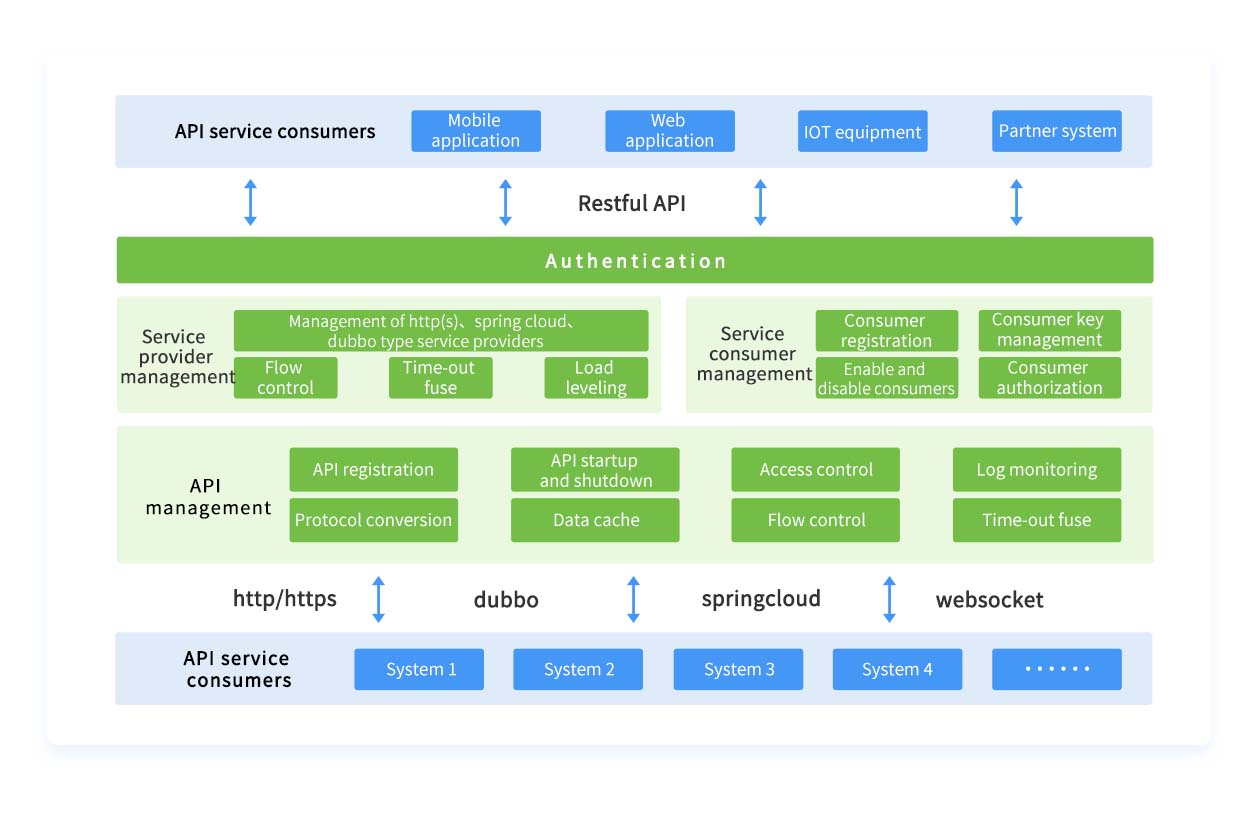-

Centralized Resource Management
Maximize API service reuse and foster collaboration across teams, departments, and partners—unlock the potential of the API economy. -

API Lifecycle Management
Deliver a simple, fast, and cost-effective API hosting solution that covers the entire lifecycle: publishing, management, and maintenance.ment and maintenance life-cycle system.
-

Effortless Operations
Enable API providers to open up data and services securely, quickly, and with minimal cost or risk—no complex setup required.
Introduction
APIGBamboocloud API Gateway empowers organizations to share and orchestrate internal capabilities. It seamlessly handles critical functions like authentication, routing, traffic control, circuit breaking, timeout handling, protocol transformation, data caching, access control, analytics, monitoring, alerting, and audit logging. By exposing proprietary and mature features through APIs, it transforms business assets and data into reusable services—driving business agility and promoting reuse.
Featutes
APIG-
Data Caching
Accelerate API response times by caching gateway configuration metadata and infrequent query results—reduce backend load and configure caching based on specific API needs. -
Flow Control
Set granular rate limits by the second, minute, or hour. The gateway intercepts requests exceeding thresholds, ensuring backend services remain reliable and performant. -
Circuit Breaking
Automatically halt and recover API services in the event of high error rates or timeouts, preventing downstream bottlenecks and preserving overall gateway stability and performance.
-
Monitoring & Auditing
Track detailed API usage, including which APIs each application calls, response times, request counts, success and failure rates, and much more. Comprehensive reports and logs offer insight into traffic, throttling, and circuit-breaking events. -
Access Control
Enforce precise API access policies by consumer identity or scenario—authorize each request based on client attributes directly within the gateway.
Application Scenarios
APIG-
01
Enterprise API Governance
Achieve systematic, standardized API management across your organization. As APIs and microservices proliferate, centralized governance eliminates redundant development, reduces resource waste, and brings order to chaotic API sprawl. Our API Gateway empowers enterprises with complete lifecycle management, unified publishing, access control, and governance. -
02
Building an API Ecosystem
Facilitate deeper collaboration, both inside and outside the organization, to establish a thriving API-driven ecosystem. With standard, secure API exposure, providers share business and data capabilities with confidence, while consumers—both internal and external—integrate diverse APIs to create new services and spur innovation.
-
03
Multi-Network and Multi-Device Support
Manage all your APIs with a single system. Easily support web, mobile, IoT, and other scenarios with one unified gateway—reducing operational overhead and simplifying development for any device, on any network. -
04
Granular Data Protection
Set fine-grained access policies tailored to different consumers and scenarios. Control exactly what data each user or application sees—improving security and reliability while reducing API development and maintenance workloads.
Architecture
APIGBamboocloud API Gateway provides a unified, secure interface for exposing services, managing permissions, enforcing traffic policies, and simplifying external integration—delivering streamlined, cost-effective governance across all your APIs.
Advantages
APIG-
Protocol Conversion
Seamlessly connect heterogeneous services. Providers develop using their preferred protocols, while the gateway exposes consistent RESTful APIs to consumers.

-
Circuit Breaking
Ensure continuous stability and performance for all clients—even if individual APIs are delayed or unavailable, the gateway keeps traffic flowing smoothly.
-
Rate Limiting
Protect backend systems from overload. The gateway enforces global and per-API request limits intelligently and efficiently.
-
Data-Level Access Control
Define custom data access strategies for different consumers—enabling secure, flexible, and compliant API exposure.

